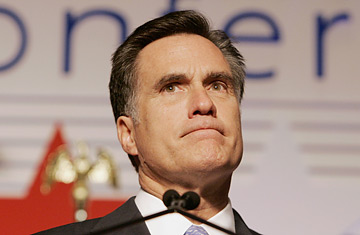
Former Massachusetts governor Mitt Romney announces that he is dropping out of the presidential race.
Mitt Romney made a fortune in management consulting, so it's only appropriate that his presidential campaign would make a bedeviling business school case study. As a candidate, he seemed to do everything right. He worked longer hours, built a larger, more professional organization and outspent all of his Republican rivals. He alone approached the race for the White House as an almost pure product launch, with the flexibility and funding to change his marketing and respond to almost any eventuality. He even looked better on television.
And yet, his campaign failed from the beginning, losing out of the gate in Iowa to a populist upstart Mike Huckabee, then losing in New Hampshire and South Carolina to a war hero, John McCain, who had been written off as an also-ran months earlier. More disappointing results followed, and on Thursday, Romney announced that he would not go on.
"This isn't an easy decision. I hate to lose," he told thousands of conservative activists at a conference in Washington. "I entered this race because I love America, and because I love America, in this time of war, I feel I must now stand aside, for our party and for our country."
The crowd at the Conservative Political Action Conference, where Romney had helped launch his campaign in 2007, called out in despair. But the anguish of activists could not change Romney's fate. He had been bested in nearly every major contest he had entered, save the states he had once called home, Michigan, Utah and Massachusetts. The delegate count made victory nearly impossible. "You guys are great," Romney told the crowd, as people called out to him, "No!" and "Go all the way."
As a problem for political scientists, Romney's failure is far less difficult to understand, since the very qualities that made him such a success in the private sector helped prove his undoing at the polls. In politics, unlike business, adaptability can be a liability. In politics, unlike business, success is not measured in strictly quantitative terms. Voters want leaders, not just capable managers — men or women who can inspire trust and inspiration. Romney never convinced enough voters that he was that man.
By all appearances, Romney approached the problem of winning the White House with the same rigor of the "strategic audits" that allowed him to earn more than $100 million as a business consultant at Bain Capital. Beginning shortly after his victory as Massachusetts governor, he appeared to shift his more moderate stances on a number of hot-button issues. In each case, his new position lined up remarkably well with the conservative base of the Republican Party. Just years after courting the gay vote in Massachusetts, Romney became a national spokesman for the sanctity of heterosexual marriage. After running two campaigns as a pro-choice politician, he became a leader of the pro-life cause in Massachusetts. Despite scant experience as a hunter and a history of supporting some gun control, he joined the National Rifle Association.
This provided easy fodder for his Republican opponents, who attacked him mercilessly, and often unfairly, as a candidate without convictions. At the conservative conference in 2007, Romney brought in hundreds of supporters to win a highly symbolic straw poll. But the press focused much of its attention on the detractors in the crowd — the supporters of Sen. Sam Brownback, who handed out "Mitt-flop" sandals and the person dressed as a porpoise in the hallways, introducing himself as "Flip Romney."
Until the end, Romney persevered without any apparent faltering of enthusiasm or optimism, focusing enormous amounts of money and time on the earliest primary states, Iowa, New Hampshire and South Carolina, with a travel schedule that constantly out-hustled his rivals. He also adapted to the shifting political terrain, most notably staking out a hawkish stand on illegal immigration, and remaking his central campaign theme at several points. Most of the time, he pitched himself as the one true conservative who could win the White House, appealing like no other candidate to national security hawks, tax cutting conservatives, and evangelical voters, many of whom were skeptical of his Mormon religion. At other points, when the economy more recently became a central concern of voters, he focused more on his business background. For such a usually well-polished corporate leader, Romney also managed to make quite a few memorable gaffes in his efforts to prove his conservative credentials, such as when he called for doubling the number of terror detainees at Guantanamo.
In the end, it was an evangelical pastor, Mike Huckabee, who proved to be Romney's undoing. Though Romney all but staked his candidacy on the first caucus state, Iowa, he lost there to the under-funded Huckabee by nearly double-digits. The Iowa loss weakened him in New Hampshire, where he has a vacation home. Then when he tried to establish himself as the conservative alternative to McCain in the south on Super Tuesday, Huckabee again rose to defeat him on a bare bones budget.
Ironically, Romney's remarkable strengths as a corporate visionary and manager proved to be his weakness as a candidate. At his town halls in Iowa, New Hampshire and South Carolina, voters often came away saying they were impressed with what he said, but unsure of him as a leader they could trust. As a candidate, Romney presented himself to voters as a product, branded as a conservative and proven as manager. But he struggled to move beyond the polished pitch to make a real connection with voters. Over the course of his tireless struggle for the presidency, he learned a lesson that has bedeviled many a candidate before him: It is often easier to win in business than to win in politics.
